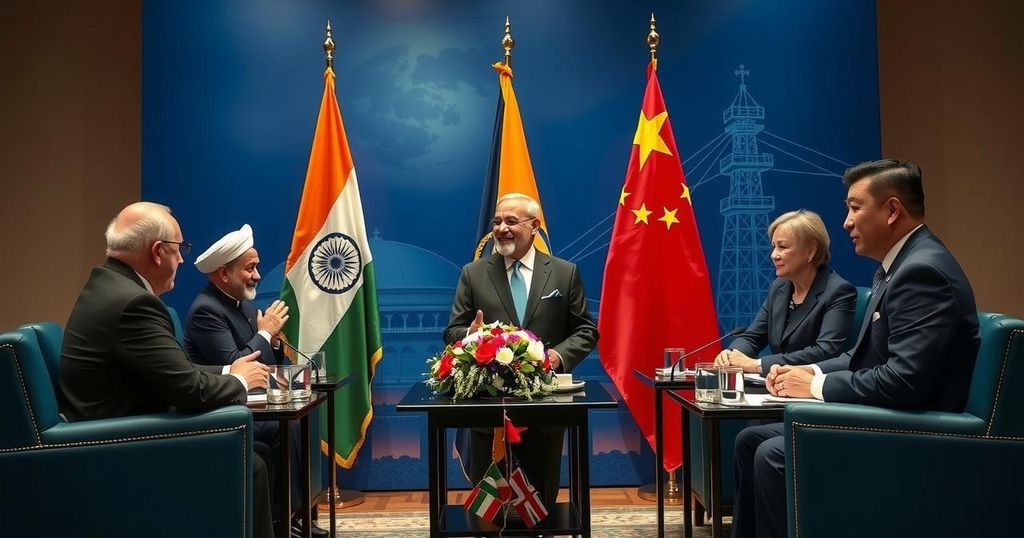Putin Hosts BRICS Summit to Forge a New World Order Against Western Hegemony

Russian President Vladimir Putin convened the BRICS Summit this week, bringing together over two dozen nations to deliberate on establishing a “new world order” aimed at reducing reliance on the U.S. dollar and challenging Western hegemony. Key discussions included improving China-India relations and addressing the necessity for an alternative payment system to SWIFT, amidst concerns surrounding sanctions imposed by Western nations.
This week, President Vladimir Putin of Russia hosted over two dozen nations at the BRICS Summit in Kazan, Russia, aimed at discussing a “new world order” that seeks to diminish the influence of Western powers and reduce dependency on the U.S. dollar. Taking place from Tuesday to Thursday, this summit represents President Putin’s most significant global event since the onset of the Russian invasion of Ukraine in 2022. The BRICS alliance, which comprises Brazil, Russia, India, China, and South Africa, aims to lessen reliance on the dollar to avoid sanctions imposed by Western nations. During the summit, President Putin remarked, “The dollar is being used as a weapon… I think that this is a big mistake by those who do this.” This summit has also fostered discussions concerning improved relations between China and India, following a recent agreement aimed at resolving their longstanding military tensions over the Himalayan border. Amidst rising geopolitical tensions, India has been enhancing its economic ties with Russia by purchasing discounted oil in defiance of global sanctions. The BRICS coalition has recently expanded to include Iran, Egypt, Ethiopia, the UAE, and Saudi Arabia, with many other countries such as Turkey, Pakistan, Azerbaijan, and Malaysia seeking membership. Collectively, BRICS accounts for approximately half of the world’s population and 35% of global economic output. While the summit focused on anti-Western rhetoric led by Russia, nations such as Brazil and South Africa advocate for a more moderated approach concentrated on reforming international institutions like the World Bank to better address the needs of developing countries. However, significant challenges remain, notably in establishing an alternative payment system to SWIFT and developing a strategy to replace the U.S. dollar as the dominant global currency. Iranian President Masoud Pezeshkian asserted that BRICS must transcend being merely a “dialogue club” and criticized Western sanctions as a barrier to global peace. In his words, “This monopolistic outlook has resulted in increased violence, war, and terrorism on the one hand, and unprecedented use of economic and political sanctions on the other.” In the context of declining dollar dominance, which now comprises about 59% of global reserves, former President Donald Trump expressed concerns regarding sanctions applied to nations that disregard the dollar, contending that losing its status as the global currency would equate to a loss in geopolitical standing.
The BRICS Summit serves as a platform for emerging economies to articulate their economic strategies and geopolitical aspirations in a landscape increasingly dominated by Western powers, particularly the United States. Originating as an acronym for Brazil, Russia, India, China, and South Africa, BRICS has evolved to include additional members, reflecting the interests of a broader coalition seeking to counterbalance Western influence. The discussions held at the summit are crucial in shaping the future of international relations and economic partnerships, especially in light of ongoing sanctions and economic pressures from the West.
In conclusion, the BRICS Summit underscores a significant shift in global power dynamics as nations convene to explore alternatives to Western-dominated financial systems and to strengthen their economic alliances. While the push for reduced dollar dependence gains traction, the coalition faces considerable challenges in establishing a cohesive strategy that effectively addresses the financial infrastructure needed for international trade. The summit also highlights aspirations for greater cooperation among member states to reform international institutions in response to the evolving needs of the Global South.
Original Source: www.foxnews.com








